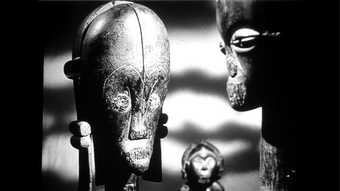This is a rare chance to view two of the most significant surrealist films side by side. The films are: Les statues meurent aussi, directed by Alain Resnais, Chris Marker and Ghislain Cloquet (1953) and L'invention du monde directed by Michel Zimbacca and Jean-Louis Bédouin (1952).
Statues Also Die is a French surrealist film. It explores how the perception of historical African Art has been affected by colonialism and issues of modern commercialisation of African culture. The Invention of the World shares an anti-colonialist commitment and is a poetic composition sharing artefacts from around the world. The commentary is by poet Benjamin Péret.
This event seeks to unpack the films content and explore the ambivalent ways in which European surrealists in the 1950s positioned themselves against colonialism and imperial oppression. The films are framed by focused talks, a chaired panel discussion and an extended Q&A.
Organised with Hyundai Tate Research Centre: Transnational in partnership with Hyundai Motor.


